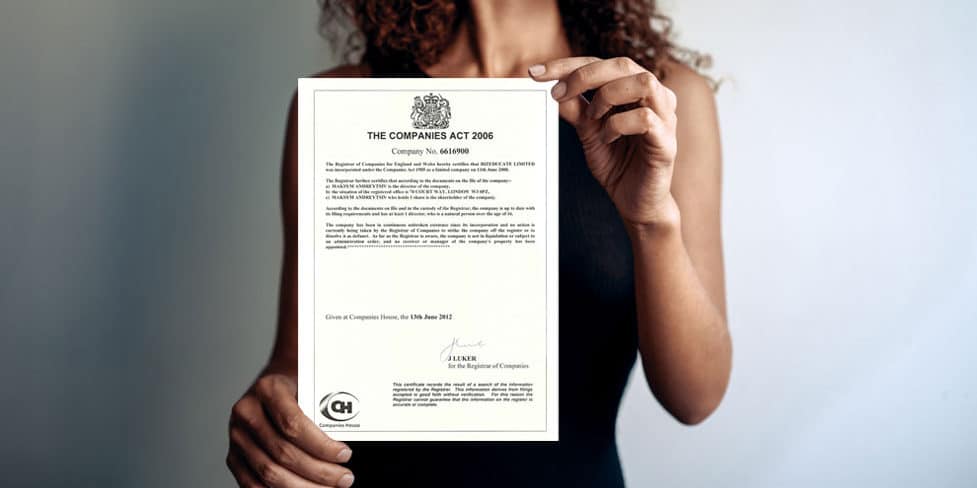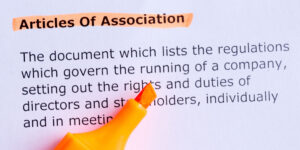A Certificate of Good Standing can be obtained from Companies House for any UK-registered private limited company that has been in continuous, unbroken existence since the date of its incorporation and has complied with all statutory filing requirements since that date.
To meet the criteria for this certificate, your company must not have any overdue fees or charges at Companies House or HMRC, nor should there be any actions being taken against the company to have it struck off the register.
If you wish to apply for a Certificate of Good Standing for a private company limited by shares or guarantee, you must ensure that:
- the company has at least one ‘natural’ director (i.e. a human being, not a corporate body) over the age of 16
- the annual confirmation statement (formerly called the annual return) and annual accounts are delivered to Companies House by their statutory filing deadlines
- changes to your company’s registered details are reported to Companies House and/or HMRC within the required timeframes
If your company can satisfy all of these requirements, you can get a Certificate of Good Standing at any time after company formation.
Why would I require a Certificate of Good Standing?
There are several reasons why a UK-registered company would need a Certificate of Good Standing.
Trading overseas
The main reason to apply for a CGS is to trade in another country or set up an overseas branch or office. In such instances, you will likely need to provide the certificate to certain authorities in the country you’re planning to operate. For example, its registrar of companies.
Opening an overseas bank account
Additionally, if you want to open an overseas bank account for a UK company, you will normally have to prove your company’s good standing status.
However, be aware that the certificate in no way verifies that your company is financially sound. Financial institutions will request additional information and conduct credit checks to confirm this.
Running a UK company with non-resident directors
Trading internationally is not the only reason for obtaining a certificate. You may need to provide one if you want to open a UK business bank account for a company with non-UK resident directors.
This is not uncommon – many overseas citizens and residents choose to set up limited companies in the UK.
Satisfying third parties in the UK
Third parties in the UK may also request a Certificate of Good Standing in the following circumstances:
- Applying for a business loan
- Leasing commercial premises
- Opening a new business bank account
- Working with new suppliers
- Applying for trade credit
- Seeking new business partners or investors
- Bidding on high-value contracts
By demonstrating that your company meets all of its regulatory obligations, third parties will be confident that your business is credible, professional, and well organised.
What details are displayed on the certificate?
The following details are displayed on a Certificate of Good Standing :
- registered name of the company
- company registration number (CRN)
- date of incorporation at Companies House
- names of all current company directors
- name of company secretary (if applicable)
- registered office address
- date of issue
The certificate will also include a good standing statement to the effect that the company is up to date with its filings, has at least one natural director over the age of 16, has been in “continuous, unbroken” existence since incorporation, and is not subject to any actions regarding its dissolution, liquidation, or administration.
These certificates are only valid for 3 months from their date of issue. After that time, you will have to apply for an up-to-date certificate, if required.
Using the Certificate of Good Standing overseas
One of the primary uses of a Certificate of Good Standing is to demonstrate to foreign authorities, regulators, and organisations that your UK limited company is in good standing with Companies House. However, many of these third parties will ask you to ‘legalise’ the certificate for use in their respective jurisdictions.
You will need an apostille to legalise a certificate or any other type of official UK document for overseas use. This is an official, stamped certificate issued by the Foreign, Commonwealth & Development Office, which makes certain documents legally valid in 122 different countries.
To find out more about apostilled documents and certificates, read our blog post on Everything you need to know about apostilled documents.
We also provide an Apostilled Documents Service at a cost of £99.99 per document, which you can use to legalise your Certificate of Good Standing and company formation documents for overseas use.
1st Formations Certificate of Good Standing Service
1st Formations provides Standard and Express services for obtaining a Certificate of Good Standing from Companies House. Our Standard Service is available for just £89.99 (excl. VAT), and certificates are issued by Companies House within 10 working days.
Our Express Service is available for just £139.99 (excl. VAT). The certificate will be issued by Companies House within 24 hours if the order is placed before 1pm Monday-Friday.
To apply for a Certificate of Good Standing online through 1st Formations, you will be required to provide your name and contact details, your company name and registration number, and a delivery and invoice address. Certificates are delivered via Royal Mail to any UK or overseas address of your choice for no additional charge.
So, there you have it…
We have covered everything you need to know about the Certificate of Good Standing for UK-registered companies. This includes eligibility criteria, when you might need to use one, and how to apply for a certificate.
We hope this post has been useful and given you a better understanding of the topic. If you have any questions or would like more information on our Certificate of Good Standing Service, please leave a comment below or contact our company formation team.
Please note that the information provided in this article is for general informational purposes only and does not constitute legal, tax, or professional advice. While our aim is that the content is accurate and up to date, it should not be relied upon as a substitute for tailored advice from qualified professionals. We strongly recommend that you seek independent legal and tax advice specific to your circumstances before acting on any information contained in this article. We accept no responsibility or liability for any loss or damage that may result from your reliance on the information provided in this article. Use of the information contained in this article is entirely at your own risk.






Join The Discussion
Comments (2)
Could you explain the distinction you are making with ‘natural’ director… it seems a very deliberately chosen word and I’m curious why you had to emphasize it like that. Thanks, Adrian
Hi Adrian,
A natural director is a human being. The other type of director you can have is a corporate director, i.e. a non-human entity like another company.
I hope this clarifies matters.
Best wishes